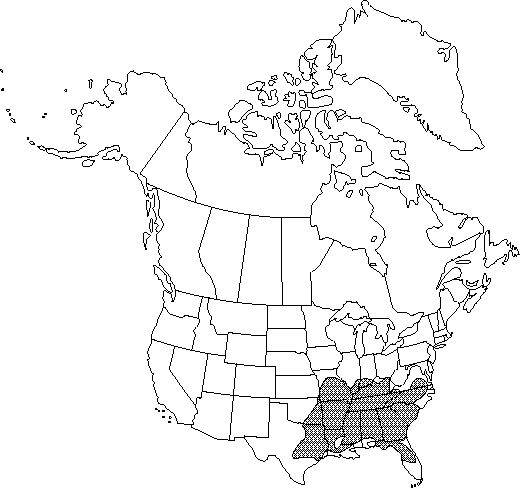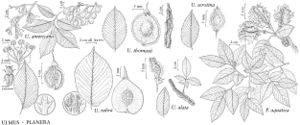Ulmus alata
Fl. Bor.-Amer. 1: 173. 1803.
Trees, 10-18 m; crowns open. Bark light-brown to gray with shallow ridges and plates. Wood hard. Branches: young and old-growth branches with opposite, prominent, regular corky wings; twigs reddish-brown, pubescent to glabrous. Buds: apex acute; scales brown to rusty, slightly pubescent. Leaves: petiole ca. 2.5 mm, pubescent. Leaf-blade lanceolate to oblanceolate, 3-6.9 × 0.6-3.2 cm, base somewhat cordate to oblique, margins doubly serrate, apex acute; surfaces abaxially with trichomes on veins, tufts of pubescence in axils of veins, adaxially glabrous to scabrous. Inflorescences short racemes, not pendulous, less than 2.5 cm; pedicel 2-7 mm, not fully expanded until fruiting stage. Flowers: calyx deeply lobed, symmetric, lobes 5; stamens 5; anthers red. Samaras gray-tan, often reddish tinged, lanceolate to oblongelliptic, ca. 8 mm, narrowly winged, margins ciliate, cilia white, 1-2 mm. Seeds slightly thickened, not inflated. 2n = 28.
Phenology: Flowering late winter–early spring.
Habitat: Alluvial woods and deciduous woodlands, especially dry, acidic woodlands and glades, along fencerows, waste areas, planted as street trees
Elevation: 0-600 m
Distribution

Ala., Ark., Fla., Ga., Ill., Ind., Kans., Ky., La., Miss., Mo., N.C., Ohio, Okla., S.C., Tenn., Tex., Va.
Discussion
Often planted as a shade tree in the southern United States, Ulmus alata is also cultivated outside North America.
The name Ulmus pumila was incorrectly applied to this species by Walter in 1788.
Selected References
None.
